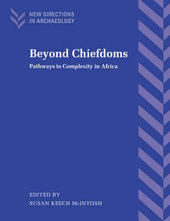
|
Beyond Chiefdoms: Pathways to Complexity in Africa
Paperback / softback
Main Details
| Title |
Beyond Chiefdoms: Pathways to Complexity in Africa
|
| Authors and Contributors |
Edited by Susan Keech McIntosh
|
| Series | New Directions in Archaeology |
|---|
| Physical Properties |
| Format:Paperback / softback | | Pages:188 | | Dimensions(mm): Height 246,Width 190 |
|
| ISBN/Barcode |
9780521022699
|
| Classifications | Dewey:306.2096 |
|---|
| Audience | | Professional & Vocational | | Tertiary Education (US: College) | |
|---|
| Illustrations |
7 Tables, unspecified; 12 Maps; 3 Halftones, unspecified
|
|
Publishing Details |
| Publisher |
Cambridge University Press
|
| Imprint |
Cambridge University Press
|
| Publication Date |
10 November 2005 |
| Publication Country |
United Kingdom
|
Description
Recent critiques of neoevolutionary formulations that focus primarily on the development of powerful hierarchies have called for broadening the empirical base for complex society studies. Redressing the neglect of sub-Saharan examples in comparative discussions on complex society, this book considers how case material from the region can enhance our understanding of the nature, origins and development of complexity. The archaeological, historical and anthropological case materials are relevant to a number of recent concerns, revealing how complexity has emerged and developed in a variety of ways. Contributors engage important theoretical issues, including the continuing influence of deeply embedded evolutionary notions in archaeological concepts of complexity, the importance of alternative modes of complex organization such as flexible hierarchies, multiple overlapping hierarchies, and horizontal differentiation, and the significance of different forms of power. The distinguished list of contributors include historians, archaeologists and anthropologists.
Reviews..."certainly warrents careful consideration by anyone with an interest in the development of political complexity...Especially notable are what it has to say about research strategies in very large, but largely unknown, regions; the interplay between ethnography, oral tradition, and archaeological research; and the contributions regionally-focused archaeology can make to wider theoretical debates...I should stress this volume's inherent value as a representation of our growing knowledge of the diverse richness of world archaeological history." Canadian Journal of Archaeology
|